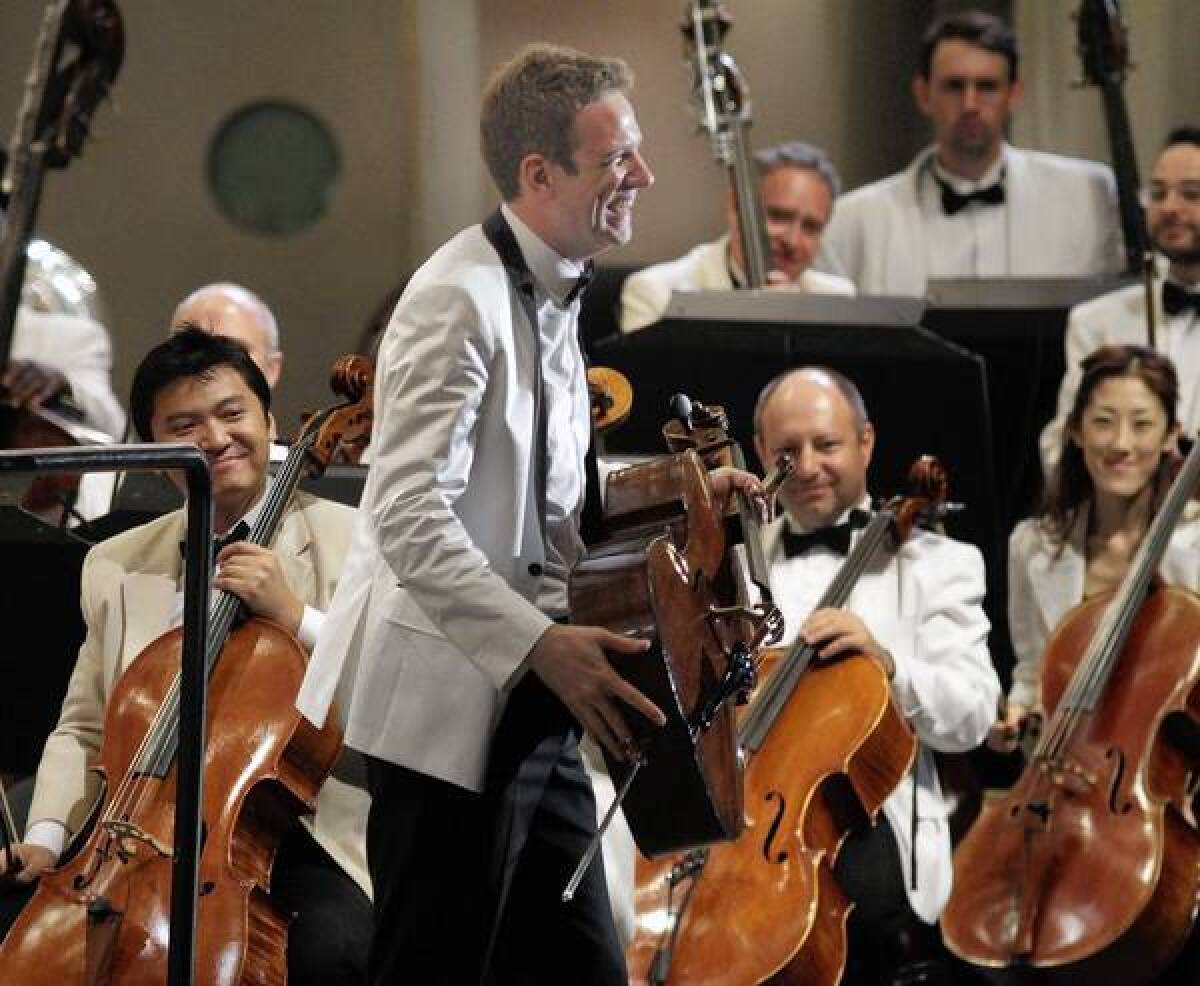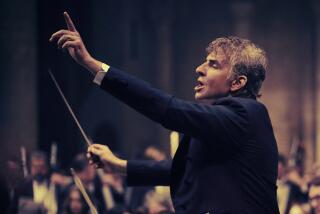Review: Bramwell Tovey gets the job done with L.A. Philharmonic

Some conductors speak to the audience at the Hollywood Bowl. Some don’t. It’s up to them, but a few well-chosen remarks can be a good way to get an audience’s attention. Plus, this summer’s new hi-def video screens are meant to bring the intimacy of watching TV in your living room to the immense amphitheater.
Last week, the normally talkative and illuminating Michael Tilson Thomas remained unaccountably silent for two infrequent Bowl appearances. British conductor Bramwell Tovey is not an infrequent guest at the Bowl and not one to remain silent under any circumstance. He was back on Tuesday, and the first thing he told the audience is that he had lost his voice that afternoon. But he found it somewhere. His throat was dry. His wit was drier.
------------
FOR THE RECORD:
New conductor: A review in the Aug. 9 Calendar section of a concert by the Los Angeles Philharmonic conducted by Mirga Grazinyte-Tyla said that Grazinyte-Tyla was not scheduled to conduct any subscription concerts during the Phil’s upcoming season. Grazinyte-Tyla will lead the orchestra at Walt Disney Concert Hall on March 1, which is a subscription concert. —
------------
The program, if not Tovey’s entertaining remarks (he’s a master at backhanded compliments), was serious. The main works were Elgar’s cheerless Cello Concerto, with Johannes Moser as the intense soloist, and Sibelius’ somber Fifth Symphony. But the evening began a little lighter with Benjamin Britten’s “An American Overture,” and thus began a riff. First, Tovey took note of British composers with double letter initials (such as Benjamin Britten and Edward Elgar).
PHOTOS: LA Opera through the years
Then he got on to the subject of musicians with last names of countries, such as (if misspelled) Britten. Others include Dave Holland, John Ireland, Irving Berlin and Erroll Garner. Think about it, Tovey said of the last one. I did. Ghana, a friend finally explained, pronounced with a British accent.
For all his cleverness, Tovey does not attempt to be a clever conductor. He fits very much in the British tradition of getting the job done, which is an excellent attribute during the L.A. Phil summer season, when rehearsal time is minimal. He is never fancy on the podium, and he never lets a listener down. Tovey was formerly the L.A. Phil’s principal guest conductor at the Bowl. Once Gustavo Dudamel proved to be a Bowl-hound, Tovey simply became a regular guest conductor, but his title these days might be Mr. Bowl.
“An American Overture” is a Britten anomaly, but it is only acknowledgment of the composer’s centenary at the Bowl this summer. The score was written in 1941 in Escondido, one of the places in the U.S. where the British composer waited out World War II. Although the overture was written for the Cleveland Orchestra and Artur Rodzinski (a former music director of the L.A. Phil), they never performed it.
PHOTOS: Arts and culture in pictures by The Times
Britten lost the score, forgot about it and later tried to disassociate himself from the work. But musicologists were on to him. Simon Rattle finally gave the premiere with the City of Birmingham Symphony Orchestra in 1983 and shortly afterward led the U.S. premiere with the L.A. Phil. Tovey did not, as Rattle does in his recording, emphasize Britten’s peculiar instrumental atmosphere. Tuesday’s quick reading let the main theme simply be the good tune that it is.
Elgar’s concerto was not gloomy either. In his remarks, Tovey took issue with program notes that noticed how the concerto “moves from dour to dourer.” The conductor said, knowing what a manic-depressive place Hollywood can be, that he had no intention of driving anyone in the audience to seek therapy in the morning.
Mainly Tovey supported Moser, whose performance was elegant and vivid. Moser’s tone is beautiful, and he was richly expressive in the sublimely sad slow movement, but he was never even vaguely morose. The 1919 concerto is Elgar’s last major work and commonly interpreted as a composer’s nostalgic farewell to the Edwardian era in which he was most at home. The latest Elgarian scholarship, however, reveals an Elgar more of his time than formerly given credit. Moser and Tovey were up to date.
TIMELINE: Summer’s must see concerts
Tovey’s performance of the Sibelius Fifth Symphony was a rebuttal against moodiness. Last week Tilson Thomas brought a subdued atmosphere to Sibelius’ Violin Concerto (in which Gil Shaham was soloist). Tovey went more for propulsive excitement and proved Bowl-proof. The new sound system was friend to horns and winds, and it helped quiet plucked strings speak.
For some reason (to sell tickets, maybe) a cursory fireworks encore followed. The accompanying music was an excerpt from Grieg’s “Peer Gynt.” The skies were not illuminated for long and neither the lighted shell nor the vivid video screens were dimmed. But the fireworks were a knockout nonetheless. And, with the attendance at 7,622, the Bowl sold a decent number of seats.
More to Read
The biggest entertainment stories
Get our big stories about Hollywood, film, television, music, arts, culture and more right in your inbox as soon as they publish.
You may occasionally receive promotional content from the Los Angeles Times.







